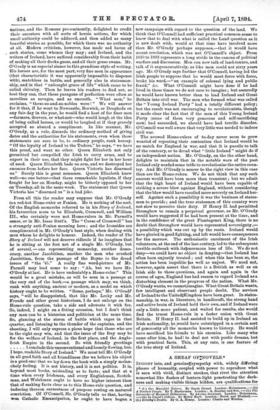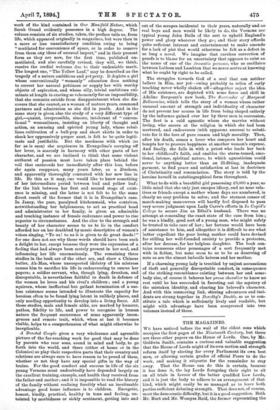SHEAF OF:NOVELS.* INSIGHT into, and genuinersympathy with, widely altering phases
of humanity, coupled with power to reproduce what is seen with vivid, distinct strokes, that rivet the attention somewhat like flashes of lantern-light penetrating the dark- ness and making visible things hidden, are qualifications for
• (L) Our Manifold Nature. By Sarah Grand. London : Heinemann.—(2.) A Devoted Couple. By T. Masterman. London : a. Bentley and Son.--(3.) The Surrender of Margaret Bellarmine. By Adeline Sergeant London : Heinemann. —(4.) In Cupid's College. By Mabel Hart. London : Hurst and Blacken.— (5.) Dorothy's Doable. By G. A. Reidy. London: Ohatto and Windua. work of the kind contained in Our Manifold Nature, which Sarah Grand evidently possesses in a high degree. The volume consists of six studies, taken, the preface tells us, from life, which appeared originally in magazines, but were then in a more or less unsatisfactory condition owing to being "mutilated for convenience of apace, or in order to remove from them any ideas of unusual import," and in their present form as they are now, for the first time, published un- mutilated, and also carefully revised, they will, we think, receive the cordial welcome due to their undeniable merit. The longest one, "The Yellow Leaf," may be described as the tragedy of a nature ambitious and yet petty. It depicts a girl whose conventionally " womanly " education does nothing to correct her natural pettiness or supply her with worthy objects of aspiration, and whose silly, trivial ambitions cul- minate at length in craving so vehemently for an impossibility, that she commits suicide from disappointment when she dis- covers that she cannot, as a woman of mature years, command partners and admiration as she did in youth. And in the same story is given also the study of a very different type of girl,—quaint, irrepressible, sincere, intolerant of " conven- tional " womanliness, insisting on liberty of thought and action, an amusing and spirited young lady, whose rebel- lious cultivation of a bull-pup and short skirts in order to shock her oppressively proper aunt, is felt to be quite legiti- mate and justifiable. But the meekness with which (as far as is seen) she acquiesces in Evangeline's carrying off her lover, is scarcely in harmony with other parts of her character, and we are inclined to think that some violent outburst of passion must have taken place behind the veil that enshrouds her immediately after this loss, before she again reappears, many years later, as a Duchess, and apparently thoroughly contented with her new line in life. Be this as it may, one would like to know something of her intermediate period between bud and yellow led; for the link between her first and second stage of exist- ence is missing, and the latter is not felt to be the same direct result of the former that it is in Evangeline's case. In Janey, the poor, paralysed kitchenmaid, who contrives, notwithstanding her helplessness, to act as practical head and administrator to her family, is given an admirable and touching instance of female endurance and power to rise superior to circumstances. And the clue to the strength and beauty of her character seems to us to lie in the comfort afforded her on her deathbed by music descriptive of women's voices singing, "To us ! to us it is given to do great deeds !" for one does not see why those words should have been such a delight to her, except because they were the expression of a feeling that had always been mutely present in her soul, and influencing her life unconsciously. The remaining three studies in the book are of the other sex, and show a Chinese butler, Ah-Man, whose unsuspected idolatry of his mistress causes him to sacrifice his life in endeavouring to rescue her papers; a soldier servant, who, though lying, drunken, and disreputable, is nevertheless faithful to death in defence of the woman be loves and his rival's children ; and a young squireen, whose ineffectual but gallant termination of a use- less existence seems intended to illustrate the capacity for heroism often to be found lying latent in unlikely places, and only needing opportunity to develop into a living force. All these studies, male and female alike, are marked by humour, pathos, fidelity to life, and power to recognise in human nature the frequent occurrence of some apparently incon- gruous and remote trait, which, when at last it becomes visible, helps to a comprehension of what might otherwise be inexplicable.
A Devoted Couple gives a very wholesome and agreeable picture of the far-reaching work for good that may be done by parents who rear sons, sound in mind and body, to go forth into the world, and there (either at home or in the Colonies) so play their respective parts that their country and relations are always sure to have reason to be proud of them, whether or not they have any special gifts in the way of brains. For the good conduct and success in life of the six young Vernons must undoubtedly have depended largely on the excellent training, example, and health they received from the father and mother; and it is impossible to read the history of the family without realising forcibly what an inestimable advantage good home influence is to children. Energetic, honest, kindly, practical, healthy in tone and feeling, un- tainted by morbidness or sickly sentiment, getting into and out of the scrapes incidental to their years, naturally and as real boys and men would be likely to do, the Vernons are typical young John Bulls of the sort to uphold England's. power and glory wherever they go ; and their story affords quite sufficient interest and entertainment to make amends. for a lack of plot that would otherwise be felt as a defect in so long a novel. We imagine that careless correction of proofs is to blame for an uncertainty that appears to exist as. the name of one of the dramatis personx, who so oscillates. between Lathom and Lambton that we never arrive at knowing what he ought by right to be called.
The struggles towards God of a soul that can neither believe in Him, nor yet—owing probably to relics of early teaching never wholly shaken off— altogether reject the idea. of His existence, are depicted with some force and skill in Adeline Sergeant's new book, The Surrender of Margaret Bellarmine, which tells the story of a woman whose rather unusual amount of strength and individuality of character do not prevent her course in life from being shaped entirely by the influence gained over her by three men in succession. The first is a cold agnostic whom she marries without loving, who sneers at the religion in which she had been nurtured, and endeavours (with apparent success) to substi- tute for it the love of pure reason and high morality. Then, after his death, comes a lover who conquers her heart and: tempts her to procure happiness at another woman's expense. And finally, she falls in with a priest who leads her back to her childhood's faith, and enables the storm-tossed, emo- tional, intense, spiritual nature, to which agnosticism could. never be anything better than an ill-fitting, inadequate garment, to find peace and satisfaction at last in doctrines. of Christianity and renunciation. The story is told by the heroine herself in autobiographical form throughout.
What to do with a beautiful girl possessing £8,000 a year, so- little mind that she only just escapes idiocy, and no near rela- tives or friends except a mother whose days are numbered, is clearly no easy problem to solve; and the sternest censor of match-making manceuvres will hardly feel disposed to pass. very severe judgment upon Lady Carre's efforts in In Cupid's' College to secure Jim as EthePs husband. There was no- attempt at concealing the exact state of the case from him;. he was a kindly, good sort of a young man, who might safely be trusted to take care of her ; her fortune would have been- of assistance to him, and altogether it is difficult to see what. better expedient the poor loving mother could have devised, for stilling her well-founded anxiety to provide a protector, after her decease, for her helpless daughter. The book con- tains numerous other personages of a sort frequently met with in fiction, but none seem to us to be as deserving of note as are the almost imbecile heiress and her mother.
If a charming young lady is troubled by unjust accusations. of theft and generally disreputable conduct, in consequence of the striking resemblance existing between her and some- body else, of course it behoves her pre= chevalier to know no. rest until he has succeeded in ferreting out the mystery of the mistaken identity, and clearing his beloved's character. And with this connecting link, stirring adventures and inci- dents are strung together in Dorothy's Double, so as to con- stitute a tale which is sufficiently lively and readable, bat might with advantage have been compressed into two volumes instead of three.







































 Previous page
Previous page